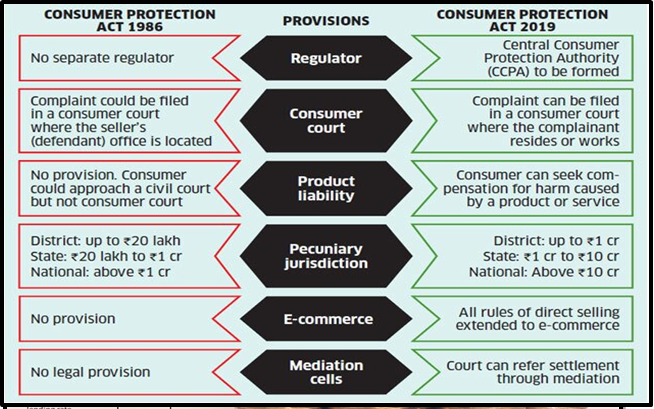SHOULD DOCTORS BE KEPT OUT OF THE CONSUMER PROTECTION ACT?
Syllabus:
GS-2:
Government Policies And Interventions
Why in the news?
- The Supreme Court’s reconsideration of holding doctors liable under Consumer Protection Act sparks debate and calls for re-examination.
- Implications on the medical profession discussed amid ongoing legal deliberations.
source:slideshare
Focus:
- Recent Supreme Court ruling prompts debate on the inclusion of doctors under the Consumer Protection Act.
- Rajeshwari Sekar and Saroja Sundaram discuss implications and alternatives.
About debate for reconsideration of holding doctors liable under Consumer Protection Act sparks debate:
- Role of Independent Authority:
- Sundaram suggests the need for an independent authority, similar to ombudsmen in other sectors, to handle medical grievances initially.
- Proposal for a body preceding consumer courts to address medical issues, enhancing mediation options under the Consumer Protection Act.
- Challenges Faced by Doctors:
- Sekar highlights challenges faced by doctors, including prolonged legal battles and frivolous litigations.
- Suggests an internal review mechanism within doctors’ associations to address grievances with expert medical knowledge, avoiding lengthy legal proceedings.
- Appropriateness of Consumer Protection Act:
- Sundaram argues in favor of patients’ recourse under the Consumer Protection Act, citing the need for effective grievance redressal.
- Consumer Protection Act viewed as a benevolent legislation to protect consumers’ rights, offering advantageous remedies.
- Opportunities and Problems:
- Sekar stresses the need for a strong regulatory authority to monitor medical professionals’ activities.
- Emphasizes on the importance of medical indemnity insurance and the challenges of court litigation.
- Sundaram highlights the effectiveness of Consumer Disputes Redressal Commissions in addressing grievances, urging a study to evaluate frivolous cases.
- Advocates for diligent service delivery and clear communication to safeguard doctors’ interests against litigation.
Understanding the “Consumer Protection Act.”(CPA):
Features:
About case of “Indian Medical Association v. V P Shantha (1995)”: Facts:
Issues Before the Court:
Judgment:
|
Highlights of the Consumer Protection Act (CPA) :
- Enacted in 1986, revised in 2019 to adapt to contemporary needs, the CPA safeguards consumer interests regarding products or services.
- Defines deficiency in service as any fault or inadequacy in quality or performance, providing consumers with avenues for complaint redressal.
- Supreme Court Ruling in Indian Medical Association vs V P Shantha (1995):
- Established doctors’ inclusion under consumer protection law, permitting lawsuits for medical negligence.
- Acknowledged the unique nature of professional occupations, emphasizing the mental effort and factors beyond control.
- Recent Case Before the Supreme Court:
- 2007: National Consumer Disputes Redressal Commission held lawyers accountable under CPA for service deficiency.
- Recent SC judgment exempted professions, including legal and medical, from CPA purview, citing the unique nature of these occupations.
- Arguments for Exempting Medical Profession from CPA:
- Medical practitioners operate in a field with variable standards, making fixed norms impractical for judgment.
- Lack of expertise in medical matters among commission members hinders effective adjudication.
- Apex Court Upholds Inclusion of Medical Profession:
- Doctors owe duties of care to patients, liable for service deficiency if they fail to meet reasonable standards.
- Commission members are not required to have specific medical expertise, but parties must provide evidence for informed decisions.
Challanges:
- Complexity of medical cases demands specialized knowledge.
- Legal proceedings often experience significant delays.
- Patients bear the burden of proving malpractice.
- Frivolous litigation against doctors strains resources.
- Consumer forums lack expert understanding of medical intricacies.
- Inadequate provision for timely redressal exacerbates patient grievances.
- Lack of clarity on liability and compensation further complicates the process.
Way Forward:
- Strengthening regulatory authorities for medical practice oversight.
- Implementing efficient dispute resolution mechanisms specific to healthcare.
- Facilitating mediation as an initial step.
- Ensuring transparency in healthcare services.
- Promoting patient education about medical procedures and risks.
- Streamlining consumer forum processes for timely redressal.
- Encouraging mutual understanding between patients and healthcare providers.
Conclusion:
The debate underscores the need for a balanced approach in addressing medical grievances, considering both patients’ rights and doctors’ concerns.Suggestions for alternative mechanisms and regulatory reforms aim to streamline grievance redressal and ensure fair outcomes for all stakeholders.
Mains Practice Question:
Examine the role of the Consumer Protection Act (CPA) in addressing grievances in the medical sector, particularly regarding malpractice and adverse outcomes. Discuss the recent Supreme Court judgment and its implications on the inclusion of medical professionals under the CPA. Evaluate the challenges and opportunities in utilizing the CPA as a pathway for patients to challenge adverse medical outcomes, and propose alternative mechanisms for effective redressal.




